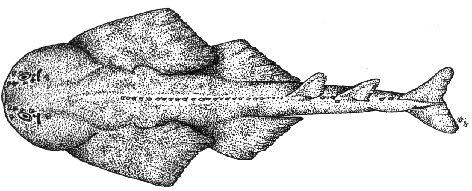Sawback angelshark (Squatina aculeata)

(Dumeril, 1829).
| Fr |
Ange de mer epineux |
| Sp |
Angelote espinudo |
| It |
Squadrolino |
Diagnosis
A greatly flattened, raylike shark with no ocelli (eye-spots) on
body; trunk rather slender; eye larger than spiracle. Nasal flap
strongly fringed. Strong, prominent dorsal spines, almost pyramidal
in form, arranged along trunk midline from head to dorsal fins and
median between these fins; some spines above eyes and above snout;
ventral surfaces with denticles only upon anterior margins of
pectoral and pelvic fins and centre of caudal peduncle. Rear tips of
pelvic fins extend to the level of the first dorsal fin
origin. Mean tooth count 21/21. Colour olive-brown or
light-brown dorsally, sometimes rather sandy, with some darker
blotches and occasional white spots, but not as obvious
ocelli; paler ventrally.
Size
To about 180cm TL but typically to circa 130cm; size at birth
uncertain.
Status and Distribution
Relatively common within a Western Mediterranean range extending
from Gibraltar to the Gulf of Gabes, Tunisia; also Spanish coasts,
Cote d'Azur, and Western Italy to Sicily. Not yet recorded from
Malta or eastwards from the Ionian Sea.
Biology
A coastal angelshark typically found on or over muddy bottoms at
depths of 50 to 500m; behavioural ecology poorly known but
apparently a predator of small teleosts such as jacks; also small
sharks such as Scyliorhinus or Squalus spp. and benthic
invertebrates, doubtless caught in very similar mode to S. squatina
(i.e., with the angelshark lying cryptically buried within bottom
substrate). Ovoviviparous, but scant reproductive data available;
matures at about124cm.
The Shark Trust, 36 Kingfisher Court, Hambridge Road, Newbury, Berkshire, RG14 5SJ, UK.
Tel(+44) 01635 551150, Fax(+44) 01635
550230
|